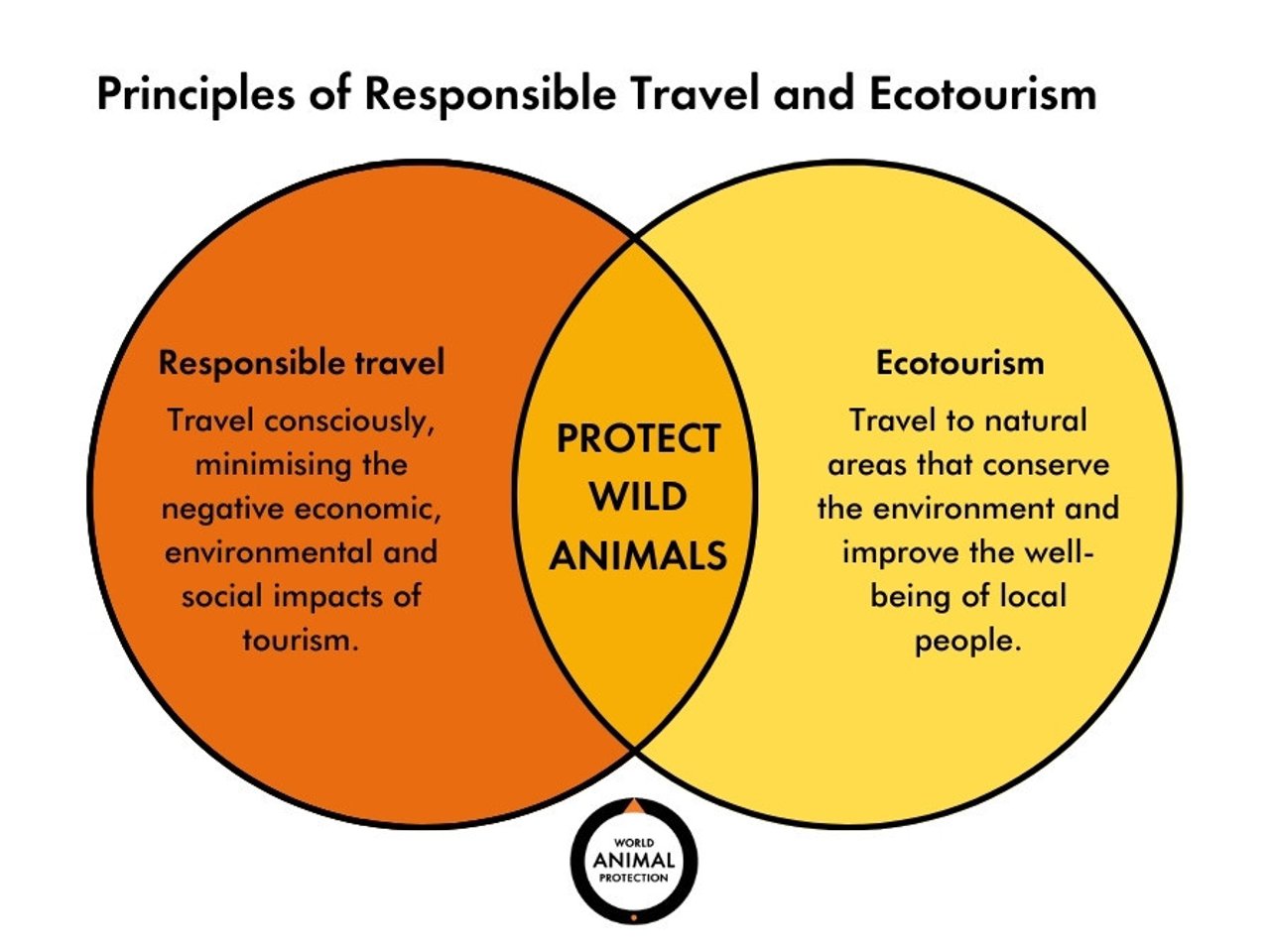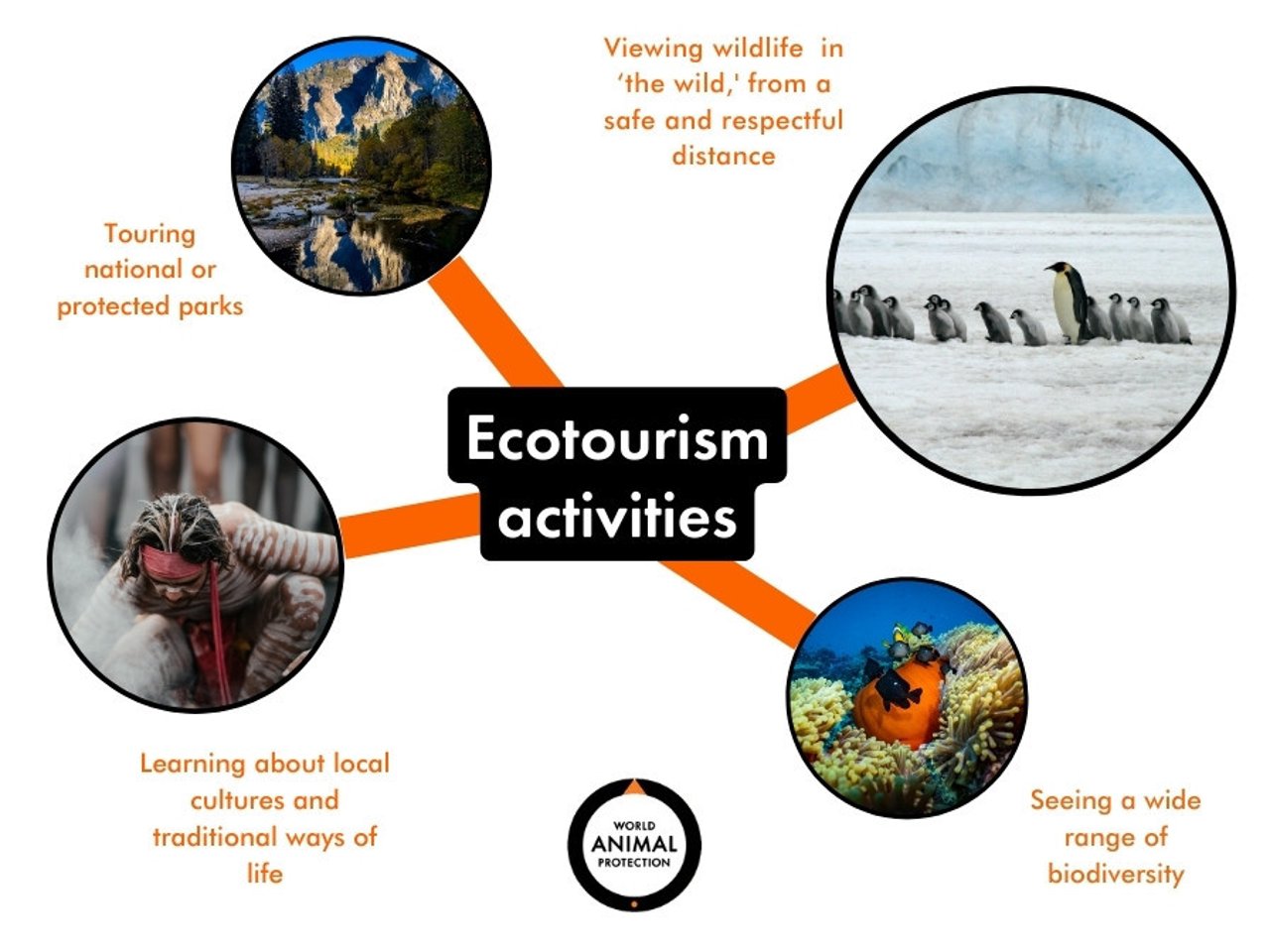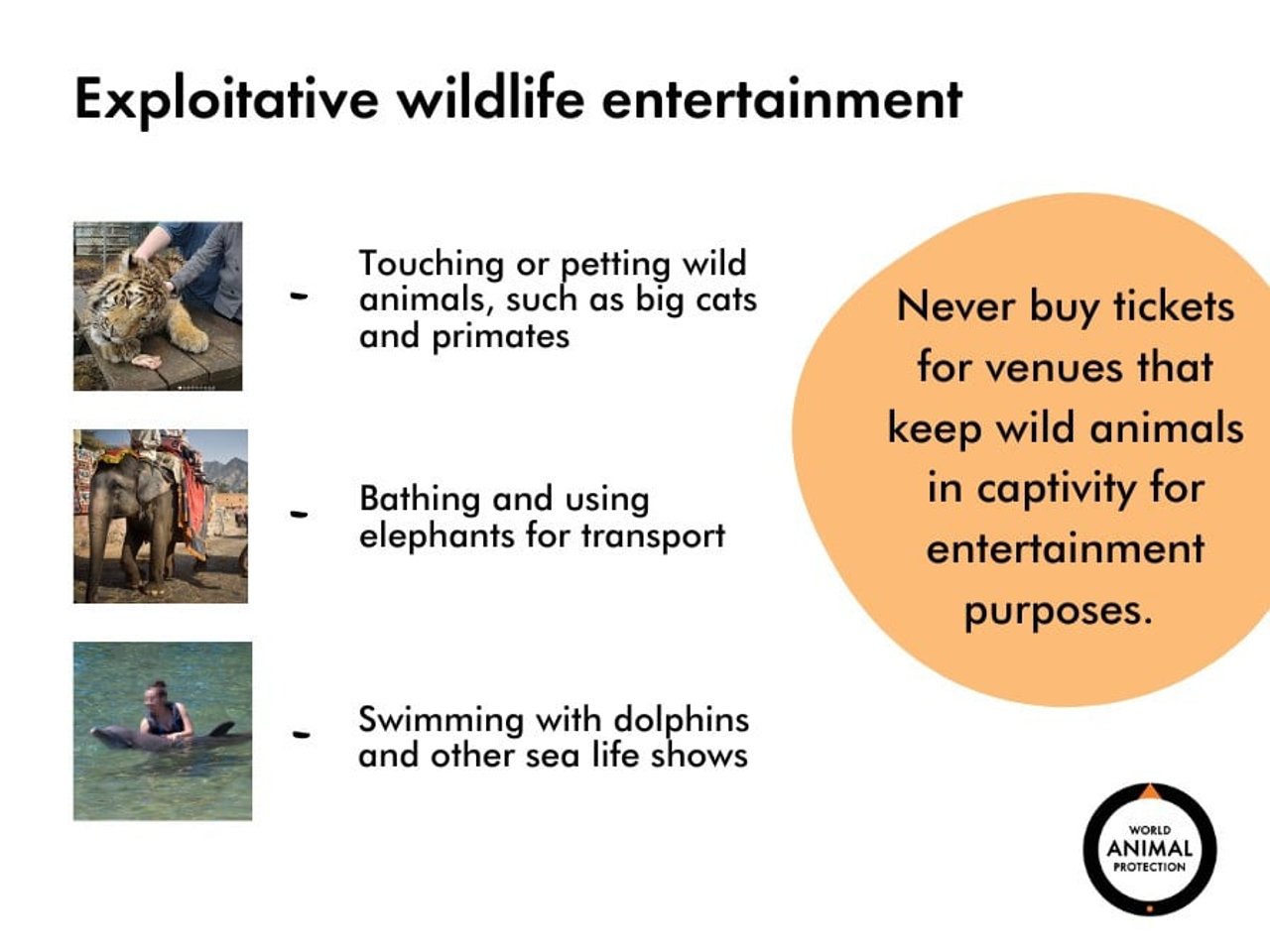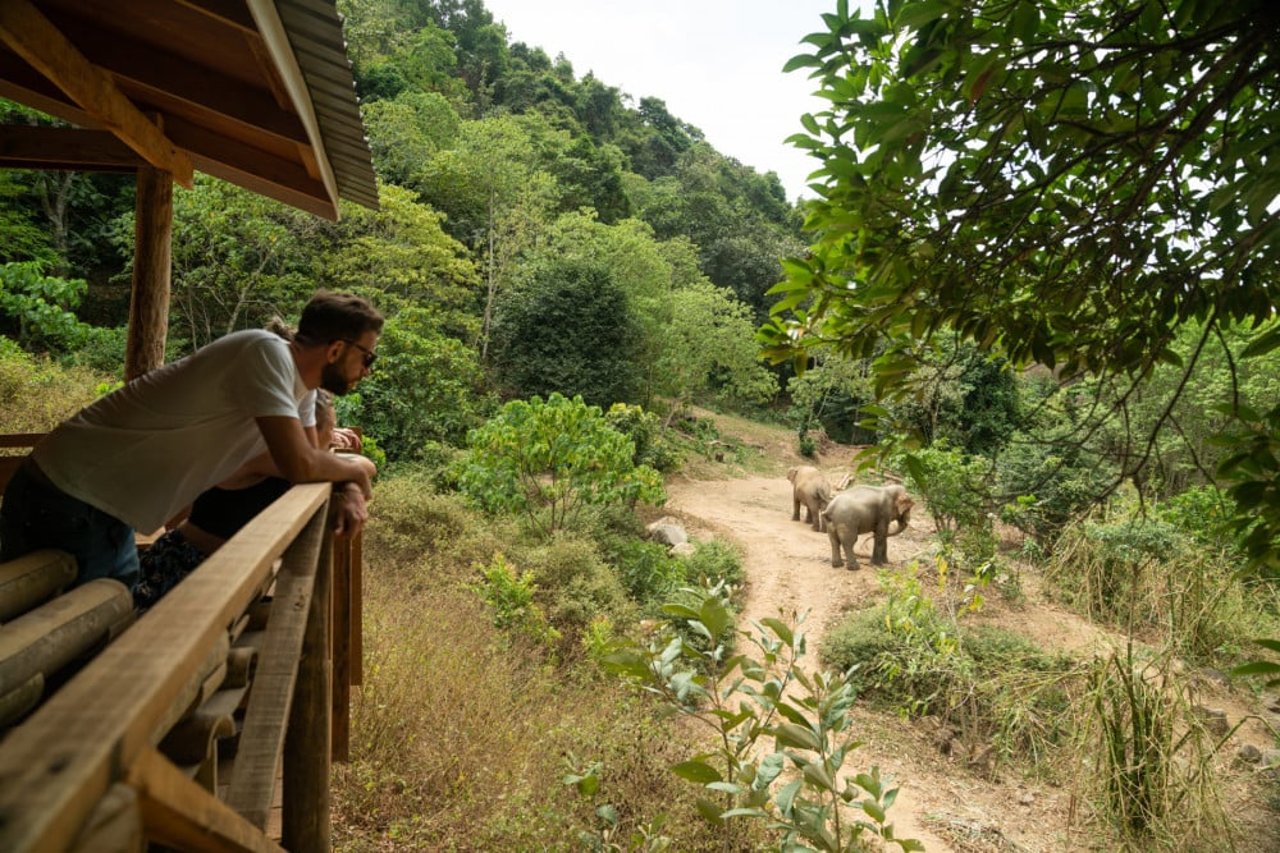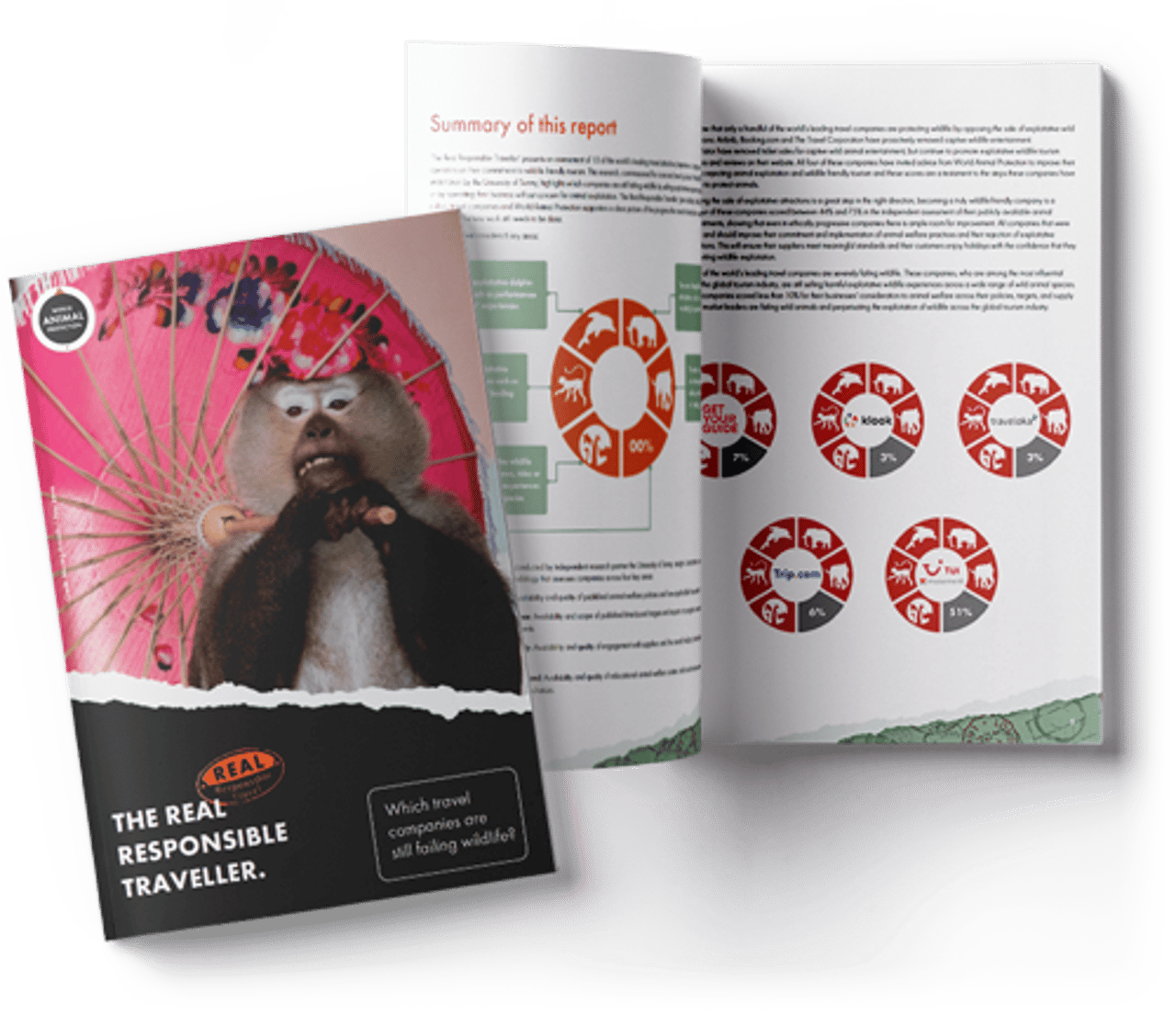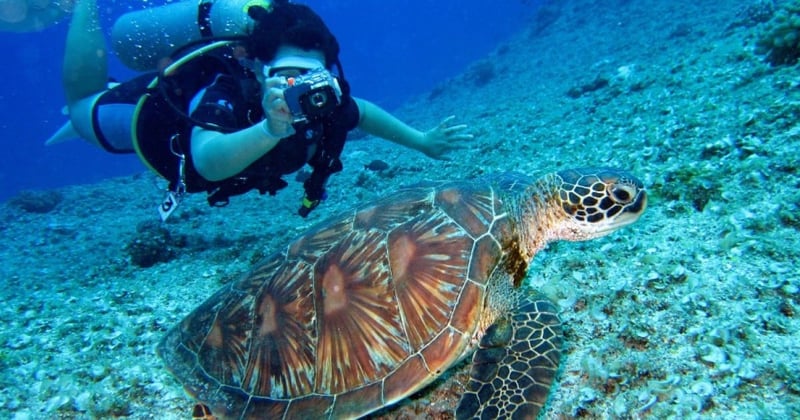
Travelling broadens the mind. We can learn about new places and people and, in doing so, we learn about ourselves. And yet, it’s essential that we do not allow animals, nature and the planet as a whole to pay the price of our experiences.
It’s here that ecotourism, sustainable travel and responsible travel all play a vital role. While responsible and sustainable travel demand that we travel consciously, ecotourism is a way for us to preserve the natural world as we learn about it. It allows us a more sustainable, kinder and thoughtful way to travel as we engage in conservation, preservation, and protection.
You might already be thinking about some aspects of ecotourism. You might be thinking of ways to limit your carbon footprint as you travel or seeking out tour operators with great eco-credentials.
Protecting wild animals from exploitation and suffering must be an important cornerstone of ecotourism, but it’s often overlooked. In this guide, we’re going to look at why animal protection is so integral to the principles of ecotourism and how we can eliminate wildlife exploitation and promote animal welfare within the tourism industry.
What ecotourism is and how it fits into the travel sector
Ecotourism is about travelling in a sustainable, respectful way. It means thinking about all aspects of the place we are travelling to; the wildlife, the environment, and the local people.
Sustainable ecotourism tries to minimise the impact of visitors on the local environment. For example, one of the key aims of ecotourism is to ensure that natural attractions and wildlife remain intact for future generations to experience.
Slogans such as “take nothing but memories, leave nothing but footprints” are an easy introduction to ecotourism for holidaymakers interested in sustainability. They are only a starting point, however.
A deep commitment to ecotourism means considering our impact on the whole ecosystem. We need to think about all the effects of our travel, not just the most visible ones. At its best, ecotourism can be a force for good. It can encourage understanding, investment, and even drive political and legislative change.
Ecotourism activities
Tourists looking to experience the natural world in a sustainable way have a wide range of ecotourism activities to choose from. The most common categories of activities include:
Holidaymakers can choose from a huge range of individual activities within those categories. Some will choose cycling tours to allow them to experience stunning landscapes with minimal impact on any local species and with almost no carbon footprint. Others may choose kayaking, nature tours, scuba diving, photography, or star-gazing.
Tourists wanting a sustainable ecotourism activity should choose the activities that best balance their personal preferences with eco-friendly options. Some will seek out opportunities that do not require air travel to avoid a negative impact on the global climate.
Many holidaymakers will prioritise supporting specific species or experiencing a particular ecosystem. They may be seeking to understand a culture, climate, or way of life.
The history of ecotourism
Many holidaymakers will prioritise supporting specific species or experiencing a particular ecosystem. They may be seeking to understand a culture, climate, or way of life.
The roots of ecotourism go back further than many people would think, and the concept has been gaining popularity since the early 1980s. Ecotourism was first recorded in the Oxford English Dictionary in 1982 as:
Tourism to areas of ecological interest (typically exotic and often threatened natural environments), esp. to support conservation efforts and observe wildlife; spec. access to an endangered environment controlled so as to have the least possible adverse effect”
In the early years of ecotourism, it was considered a niche interest and came at premium prices as a result.
The public became increasingly aware of the effects of climate change throughout the 1990s and into the 2000s. This led to much greater consideration of the ethics of travel, especially around emissions from flights.
Quickly, even mainstream travellers were requesting information about the ecological impact of their holidays and were seeking to minimise harm. Growing numbers of people wanted to experience the natural world in an authentic, untouched state
Ecotourism today
Today’s ecotourist has very different expectations and requirements than those from the 1980s or 1990s. Where ecotravellers in the past were seeking to minimise their negative effect on the world, today we want to know that we are making a positive difference.
For many, this means seeking out educational opportunities to help them develop a deeper understanding of their destination. They may also be looking for guidance and suggestions for how to support and protect the environment and the animals and people within it.
Tourism is concentrated in about 7% of the total Great Barrier Reef Marine Park
Many tourists are acutely aware of the existential threats fragile ecosystems face. They recognise that this may be their last chance to experience coral reefs or rainforests, for example.
Despite the perception that we’ve become an Instagram Generation, today’s ecotourists might be having more authentic interactions with the natural world than their predecessors.
Although we’ve made important progress, there are still some valid concerns around modern approaches to eco-friendly tourism. Well-meaning, ecotourists inevitably have an effect on the places they visit. They might alter a local economy by making tourism-related work more profitable than traditional crafts and skills. They may also promote ‘solutions’ that do not meet the needs of local people or wildlife.
The role of wild animals in modern ecotourism is of particular concern.
Wild animal protection: one aspect that ecotourism still overlooks
Sustainable ecotourism takes an ethical approach to the natural world. The ultimate aim is to do no harm as we fulfil our desire to understand and experience the natural world. This aim is in direct contrast to the effect of exploitative wildlife entertainment.
The greenwashing of animal experiences
Many well-intentioned holidaymakers choose captive animal ‘experiences’, unaware of the harm they do to the animals involved, and the potential damage to the local ecosystem, and the communities who live there.
Some of these experiences can appear harmless — or even beneficial — at first glance. For example, tourists may be keen to take part in activities such as washing elephants, swimming with dolphins, or hand-feeding primates, unaware of the harm these entertainments cause.
These interactive activities are often advertised as being either educational or conservationist. In reality, they are neither. They require wild animals to be kept in captivity and trained to behave in ways which are not natural for them. They are undoubtedly exploitative.
An elephant being used for riding and bathing with tourists
Consumers must demand animal protection
Unfortunately, these forms of exploitative tourism are highly lucrative for the companies that provide them. For example, our 2019 Behind the Smile report found a single dolphin can generate between $400,000 and $2 million. As long as consumers are unaware of their true impact, tour operators are unlikely to change their practices.
Travel companies around the world have recognised the growing value of sustainable ecotourism. They are making strenuous efforts to improve their sustainability credentials by reducing carbon emissions and other green initiatives.
Until those measures include taking serious and sustained animal protection measures, they are nothing more than greenwashing. But as tourists, we have the power to demand better practices.
The age of responsible tourism and animal protection
Responsible tourism, aimed at protecting the natural world, is utterly incompatible with exploitative wildlife entertainment.
Being a responsible tourist means never buying tickets for venues that keep wild animals in captivity for entertainment purposes. This includes venues that allow direct interaction with wild animals and all wild animal shows or performances. Responsible tourists will also turn down free tickets to these types of entertainment. They should not appear anywhere on an ethical travel itinerary.
Holidaymakers who want to improve our relationship with the natural world should also hold the tour operators and holiday companies they travel with to the highest standards of animal protection. Companies that are willing to profit from the suffering of wild animals, or those which fail to take sufficient measures to prevent animal suffering, cannot be considered allies in the drive to responsible tourism.
Ecotourism that doesn’t protect animals fails to live up to its own ethics, expectations, and aims.
Redefining ecotourism: How we can better protect wild animals
When we talk about animal protection, it’s important that we’re clear about what we mean. First, we need to be clear — wild animals' needs cannot be fully met in a captive environment.
Animal suffering is sometimes misunderstood when people assume that animals do not have complex feelings such as happiness, sadness, or joy.
The ability to feel a wide range of emotions is known as sentience. In recent years, we’ve seen an increase in scientific interest and study into animal sentience, and this research is telling us what pet owners have known for years; that animals are sentient beings.
Sentient beings are able to experience pain, fear, and suffering. Some animals also experience more complicated emotions such as grief. If animals can suffer, it cannot be ethical to inflict that suffering on them, especially for our entertainment.
We still have much to learn about the exact nature of animal emotions and suffering. We know that many species suffer when kept in captivity, despite our efforts to enrich their environment.
How ecotourism can involve and benefit wildlife — and empower local communities to care for and protect it
Ecotourism reflects our changing attitudes to our world and our place within it. We no longer see the natural world as something to be commercially exploited. We are not the owners of this world. We are its guardians instead.
A similar shift is needed when we think about the wild animals we share this world with. Wild animals are not a resource for us to commercially exploit at will. We have no right to take them away from their natural habitat or to force them to perform for our entertainment.
This shift in thinking has already begun for many eco-conscious consumers, but we need to move further and faster. Importantly, we need all holidaymakers to value animal protection, rather than just the most ecologically aware.
Creating this change requires both education and emotional engagement. Education allows consumers to make informed decisions about the companies they work with and the policies they demand.
Social media will be a valuable ally in our efforts to eliminate wild animal experiences. Preventing the sharing of selfies with wild animals, for example, sends a powerful message about the harm that these ‘entertainments’ can cause.
Protecting animals — a real-world example
A tourist enjoys the observing platform at Following Giants, Thailand
The animals involved in wildlife entertainment are often born into captivity or captured at a young age. This means that a ‘return to the wild’ isn’t always possible, practical or safe. In these instances, it’s important to create wildlife-friendly solutions for the animal's long-term health and wellbeing. The best approach is to create genuine sanctuaries where animals are kept in high-welfare environments and can only be viewed at safe and respectful distances.
The Following Giants project in Thailand is a great example of our approach. We worked with the local community and provided funding, training and support to empower them to properly care for their elephants without exploitation.
This was a major project, beginning in November 2019 and finally re-opening over a year later in December 2020. We funded new infrastructure, including a key observation deck that enabled visitors to see the elephants without disturbance and a new visitor centre.
We worked directly with the mahouts, enabling them to take part in a skill exchange programme and learn essential practical skills such as wound cleaning. The result was a venue centred around the welfare and protection of the elephants which also helps tourists to understand and value these incredible animals.
Join us demanding better from the travel industry
World Animal Protection is committed to making a real difference in the lives of captive wild animals, as well as eliminating their use in harmful, exploitative displays.
But we can’t do it without you.
Our report, the Real Responsible Traveller reviewed 13 global leaders in the tourism industry on their animal policies and wildlife offers, and uncovered that 5 leading travel companies who are severely failing wildlife by selling tickets to exploitative wildlife experiences.
We need you to show these companies that the public won’t stand for sustained animal suffering in the tourism industry.
Slogans such as “take nothing but memories, leave nothing but footprints are an easy introduction to ecotourism
